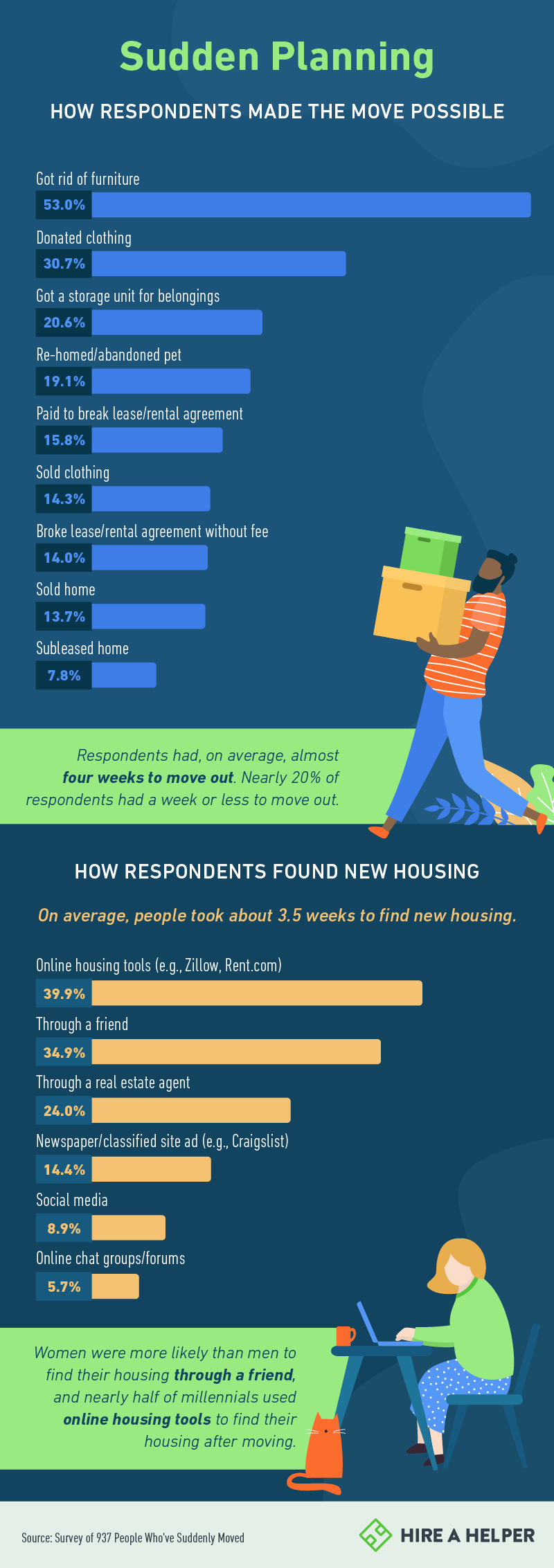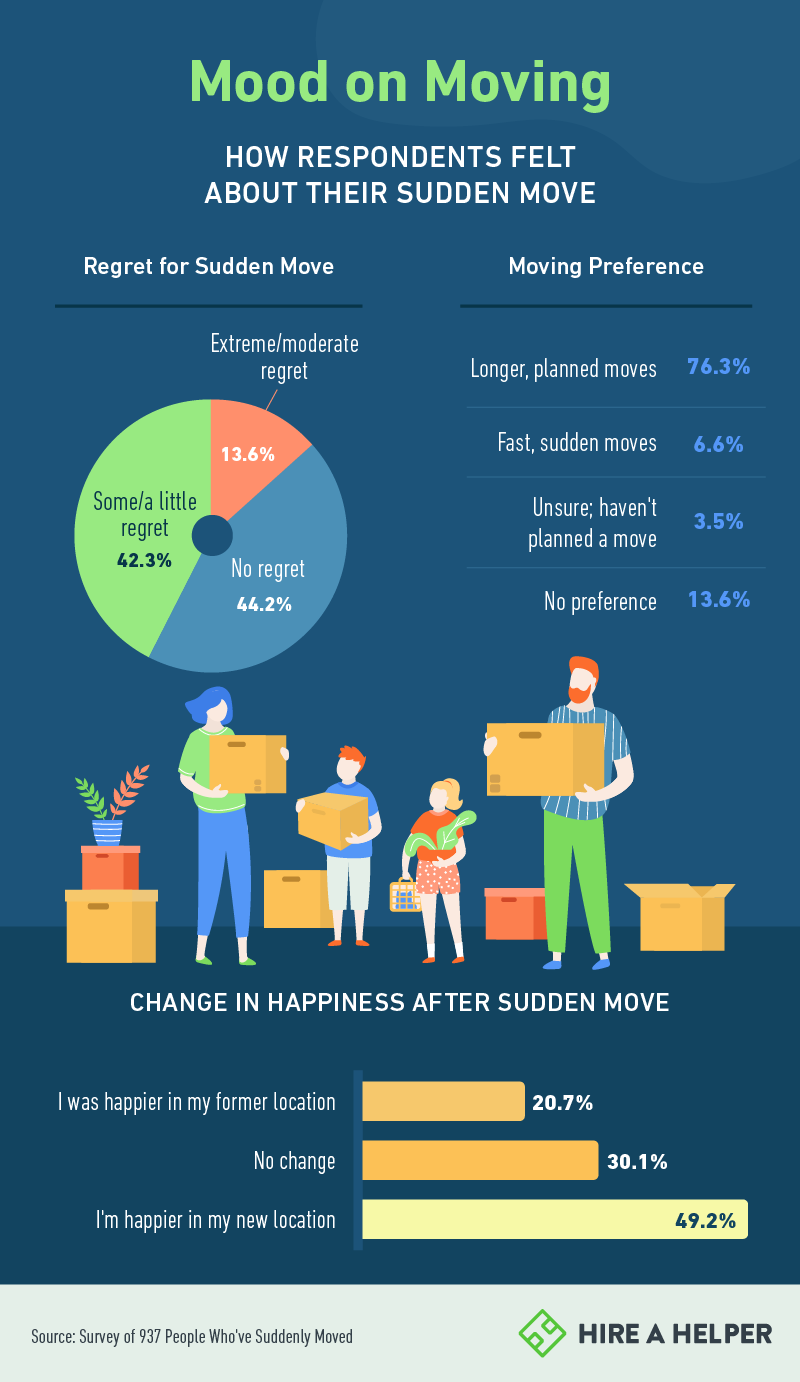

Unexpected Moves
Exploring The Reasons For Sudden Relocation
February 19, 2020
There's no good time to move. Even if you think you've dotted all your i's and crossed all your t's, the process of preparing for a move, packing your possessions, and finding a new home can be stressful. Research shows it doesn't matter if you move 20 miles or 2,000 miles, relocating can leave you feeling blue even if everything goes right.
Now, imagine a scenario where you might have to move under duress. Maybe you've experienced financial hardship or need to care for a family member.
For a closer look at what happens when we have to move suddenly and unexpectedly, we surveyed over 930 people about their experiences relocating in a rush. Read on as we explore why sudden moves happen, how people make it possible, and how the situation made them feel.
On the Move

The physical process of moving may only take a few hours, depending on the factors of your move.
Without time to prepare, however, moving may feel more like a trial by fire. So, which situations compel people to move even if they aren't ready for it? For around 1 in 5 people who'd experienced moving under pressure, the cause was financial hardship. Following monetary need, getting a new job (16%), a spouse or partner getting a new job, and relationship changes (nearly 11% each) were also common reasons for a pressed move.
Among those surveyed, Gen Xers were the most likely to move suddenly as a result of a divorce or relationship ending, while millennials were the most likely to move for a new job. In the past decade, the number of job seekers moving for new positions hit a record low, accounting for roughly 1 in 10 employees.
Making Sacrifices

Preparing for a move includes the logistics of transportation, the decision to hire a moving crew or doing it yourself, a general timeline for relocating, and a budget.
Of course, when you're moving in a hurry, you may not have as much flexibility to get things right. While those surveyed had four weeks, on average, to move, 1 in 5 had a week or less to relocate. Instead of finding a way to take all of their possessions with them, more than half of people dealing with unexpected moves either left, sold, or donated their furniture. Nearly 31% of respondents trying to manage an unexpected move had to donate clothing, while 19% had to re-home or abandon a pet.
Despite only having a few weeks (at most) before they had to move, people needed 3.5 weeks, on average, to find new housing. Forty percent used online housing tools (such as Zillow) to help them find new accommodations, while 35% found housing through a friend, and 24% used a real estate agent.
Major Transitions

Our survey found people moving in a hurry didn't always relocate across town. On average, people managing an unexpected relocation moved 229 miles, and more than 1 in 4 moved to a different state. The most popular way to move was by car (61%), compared to less than 22% who used a moving vehicle. Compared to in-state moves, fewer people received help from their family or friends when moving out of state.
Because moving cost respondents nearly $2,300, on average, more than 57% had to crack into their savings to afford the expense, while 30% used their credit cards, and nearly as many relied on support from their family.
This suggests people do not shop around for better moving options. Make sure you use consumer-friendly moving websites like HireAHelper so you can compare and contrast all your different moving options in your area, along with how much they cost.
Negative Moving Emotions

For the people who completed a move under stress, did they regret the result?
While 44% of people had no regrets moving suddenly, 42% felt at least a little regret, and 14% felt moderate or extreme regret. When asked about their preference, 76% favored a longer, planned move over something fast and sudden (nearly 7%). You may never love the moving process, but you are likely to be less satisfied the more frequently you make sudden moves.
What's the Best Way to Do a Last-Minute Move?
As you can see, people in this situation often have to leave things behind, such as their furniture, clothing, and even pets. But it doesn't have to be that way.
While last second moves are indeed difficult, HireAHelper can analyze your situation and figure out your best options for free, over the phone. With over 2,000 moving service providers in our vast movers network, we are committed to finding the most convenient (and best priced) service for everyone. Visit HireAHelper.com and search for your best last-minute options, or call us at (800) 995-5003 and let us figure out your move for you.
Methodology and Limitations
We conducted a survey using Amazon Mechanical Turk. We surveyed 937 people who had moved suddenly in the last five years. A sudden move was one that had to happen quickly and was not planned at all by respondents. All information is self-reported; therefore, there are limitations to the data presented, such as over- or under-exaggeration of any scenario. The average age of our respondents was nearly 36 with a standard deviation of 10.95. We had 538 female respondents and 396 male respondents, as well as three people who did not identify as either gender. The data presented are not statistically weighted.
Fair Use Statement
You may share this story with your readers for any noncommercial use. Just make sure to include a link back to this page in your report as credit to our team of contributors.